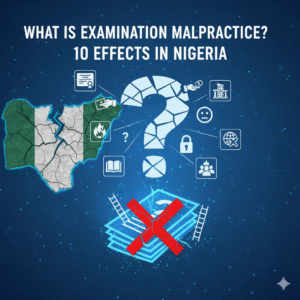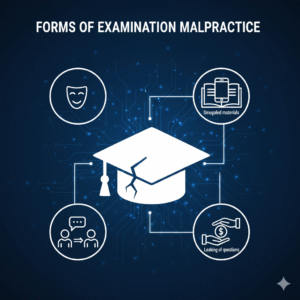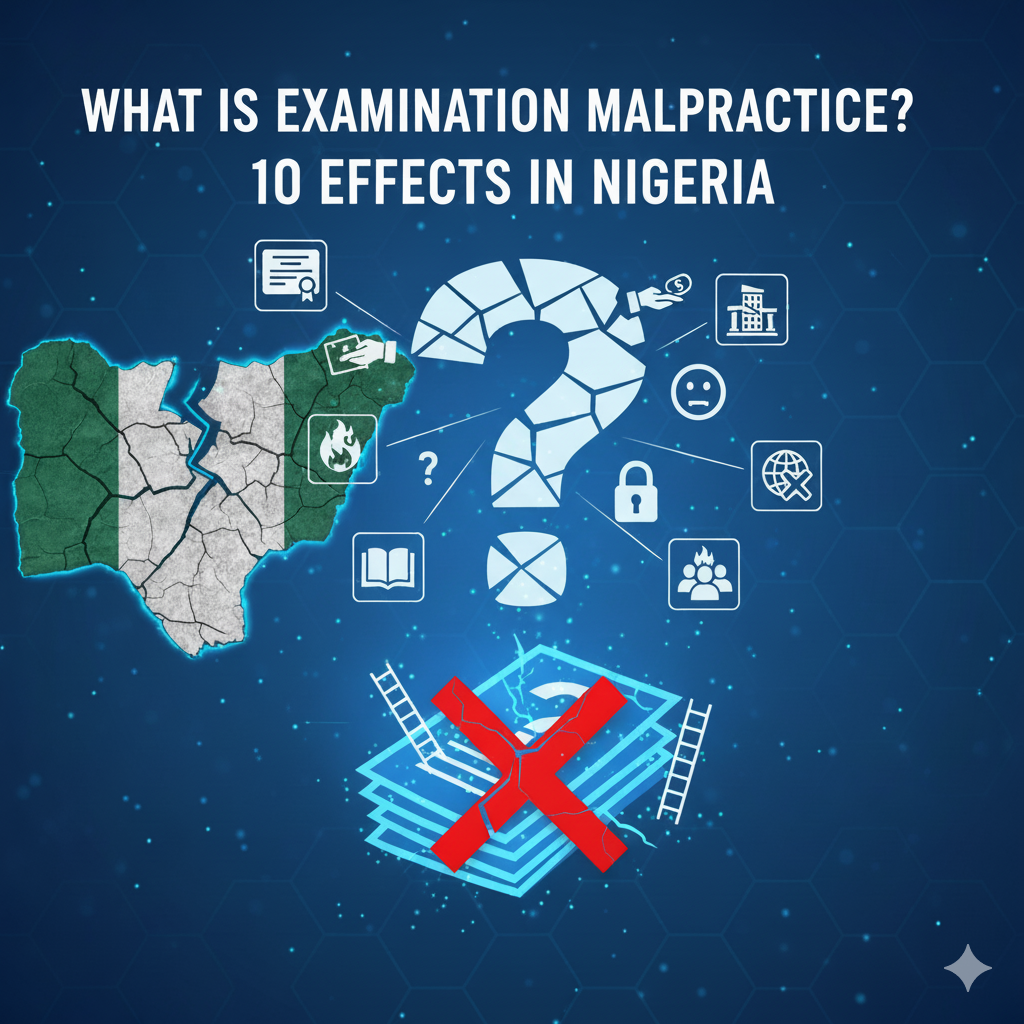What is Examination Malpractice?: 10 Effect of Exam Malpractice In Nigeria
What is Examination Malpractice?: 10 Effect of Exam Malpractice In Nigeria
Introduction
What is Examination Malpractice?
It is referred to as cheating at an examination. It is also any act that gives the test candidates an unfair advantage during an examination.
In Nigeria, Exam malpractice has become a national issue. In Nigeria, it is not just student breaking rules, but it is a national issue. It is a deep-rooted issue that destroys the future core of our society.
The effects of EXAM MALPRACTICE go beyond the four wall of the examination halls of our school.
This article reveals the 10 effects of exam malpractice in Nigeria, And how to prevent Examination Malpractice
What Is Examination Malpractice
Before, during, or after an examination, any illegal means used by a student or students is called examination malpractice.
Its purpose is to get allowed an unfair advantage over other students. It violates the rules of a test or examination.
Examination Malpractice practice includes; candidates bringing notes in the examination hall, peeping into others answer paper, impersonation, etc.

Forms of Examination Malpractice
1.Leakage of examination questions before the exam
This is a catastrophic failure of security.This is when Exam questions become public before the scheduled date.
Corrupt officials or printers often leak the papers. It gives some candidates an unbeatable, unfair advantage. And it completely destroys the integrity of the examination.
2. Impersonation
This is when a person hires someone to sit for his or her exam by hiring a mercenary writer who is mostly smarter. This is to achieve a qualification that the real candidate does not deserve. This is also a direct lie about who has the knowledge.
3. Smuggling in unauthorized materials into the exam hall
This is a form of Examination Malpractice where by candidates bring in hidden notes, textbooks, or even mobile phones.
These materials are often called “expo” or “microchips.” They are used to look up answers during the test. This bypasses the need to study and learn.
4. Copying from other candidates
This is a very common sight in exam halls. Students crane their necks to see a neighbor’s answer sheet. It is famously called “giraffing.” This act relies entirely on another person’s work. It punishes honest students while rewarding dishonesty.
5. Passing of information between candidates
Students secretly exchange information during an exam. They use hand signals, whispers, or pass small pieces of paper. This turns the individual assessment into a group conspiracy. It undermines the purpose of testing personal knowledge.
6. Mass cheating orchestrated by teachers or others
In some cases, the teachers or the school itself become responsible for the cheating acts.
The teachers may write answers on the board; in cases of oral examination, he may dictate the answers to the students. This is what is done many times to increase the performance record of the school. This is mostly common during examination like WAEC and NECO
7. Sale or purchase of exam questions or answers
In this form of Examination Malpractice, Exam questions and answers are sold for money. Some teachers or supervisors and shady websites run this illegal trade. Students pay a fee for guaranteed success. It reduces qualifications to something you can buy, not earn.

Causes of Examination Malpractice
Exam Malpractice isn’t random and it’s an indication of a more profound and many-sided issue that we’re going through.
The problem is grounded in our society, there, at our schools, and here, at our homes. Recognizing and understanding this is significant, as it is practiced by a wide number of people.
Here are some of the causes of Examination Malpractice;
1.Societal pressure
We are solely a certificate oriented society. Far too often, the accreditation of a piece of paper is worth more than the skills that have been learned.
The constant societal pressure to succeed in an unhealthy manner puts an unbelievable amount of pressure on students.
In this process, students don’t study the course material to actually learn. Their objective become just passing the exam. When society sees failing as the ultimate disgrace, there is undoubtedly a clear path to cheating that many feels obligated to take.
2.Inadequate preparation
Many students engage in Exam Malpractice since they do not study well. The reasons are many. Poor teaching, overcrowded classrooms, and lack of educational material are common. While Some learners are simply lazy.
They are short of the knowledge to pass on the exam day. Therefore the malpractice.
3. Weak institutional supervision
The prevention system is often out of order. The invigilators get compromised, the supervisors get compromised, or the officials might be bribed.
Severe punishments are scarcely put into action if ever. This leaves the environment in such a way that the examinees think they can get away with it. The risk seems less.
4. Parenting failure and lack of interest in children’s academics.
Sometimes The problem usually starts in the home. Some parents usually buy the question papers for their kids. For them, the success of the children is more important than integrity. While many parents simply have no idea if their children are cheating. These children have no moral guidance.
5. Fear of Failure
Exams have a huge consequence if failed in Nigeria. Failing an exam can bring shame to the entire family.
It can mean repeating a year and watching others progress. The fear is so intense that students lose their sense of judgment. They are ready to do anything, including cheating. It is a matter of survival to them.

10 Effects of Examination Malpractice
Examination Malpractice has consequences that go beyond one person, or one test. The effects of examination malpractice are really terrible and far reaching.
Examination malpractice is like a poison, that when introduced to the system, weakens the whole structure.
Here are 10 effects of Examination Malpractice;
1. It Discredits education
Examination Malpractice destroys trust. A single cheating candidate makes the certificate of millions of students, worthless.
When cheating is the order of the day, then we wouldn’t see a degree from Nigeria as anything.
Employers, both at home and abroad will begin to doubt every qualification. The whole education system will be looked at as a, ‘joke’. The innocent students also suffer because their hard-earned certificates are not recognized.
2. Produces unqualified graduates
Cheating during exams permits the unprepared students to pass.
These students then enter into sectors. They become doctors who can’t diagnose. They are engineers who can’t build. They become teachers who can’t teach. This flood of CRAP entering into every sector of the economy is disaster spelled on everyone’s lives and progress.
3. Lowers academic standards
When cheating becomes the norm, everything standards collapse. The system stops rewarding hard work; it rewards dishonesty.
A teacher may lower expectations because they know students will cheat anyway. The very definition of academic achievement is also affected. We moved from learning and mastering to just passing.
4. Reduces employability
Candidates from a corrupted system are inefficient in working. They have the certificates but lack the skills.
Companies know this. They hesitate to hire local graduates. Unemployment rates shoot up among the youth. Companies are forced to bring in talent from outside, putting our economy into the drain.
5. Harms national reputation
It is disgraceful that examination malpractice is now common. It is an ignominy that is widespread in Nigeria. This can give a distorted view of Nigeria.
Nigeria will be seen in the same light as having a nation full of greedy and unserious individuals. This is why foreign countries will not approve of our academic certificates. This creates problems for our students to be enrolled into foreign universities.
There is a deep injury in the name of Nigeria, and it is a difficult task for this injury to be healed.
6. Unqualified professionals
The student who cheated to pass medicine becomes a doctor. The one who copied his way through engineering becomes an engineer.
These professionals are hollow. They have the certificates but not the competence. They build bridges that collapse. They perform surgeries that kill. This puts the entire public at grave risk.
7. Corruption culture
Examination malpractice is a training ground for future corruption. It teaches a terrible lesson: that success can be bought and rules are for fools.
A young person who cheats to get a degree is more likely to give or take bribes as an adult. It normalizes dishonesty.
This rotten seed, planted in the exam hall, grows into the massive tree of national corruption that plagues Nigeria today.
8. Low self-esteem
Cheating is something and once you score good grades. You hide from it and deep down the artificial success haunts you.
You own the certificate but live in the fear of exposed as a fraud because you cannot prove that you are the deserving candidate for the certificate.
This is a lack of confidence one lives as insecurity throughout the career and lifetime of them.
9. Poor study habits
Malpractice kills the will to learn. It makes hard work seem pointless. Why spend nights studying when you can just buy the answers? This attitude creates a generation of intellectually lazy individuals.
They never develop discipline, critical thinking, or problem-solving skills. They learn how to cheat the system, not how to master a subject.
10. Workforce incompetence
This is the ultimate, catastrophic result. Our entire workforce becomes weak.
Offices are filled with graduates who cannot write a simple memo. Factories have technicians who cannot operate machinery correctly. Hospitals have staff who make fatal errors.
This widespread incompetence is the direct harvest of years of examination malpractice. It causes productivity to nosedive. It kills innovation. A nation cannot develop or compete globally when its workforce is built on a foundation of academic fraud.

What are the ways of preventing examination malpractice?
- Strict enforcement of examination rules and procedures.
- Use of biometric verification and CCTV surveillance.
- training and the employment of more competent invigilators.
- Public awareness and finding value re-orientation programs.
- increase punishment and a conviction for any offender strictly.

What is the punishment for Examination Malpractice in Nigeria
Examination Malpractice is not just a school rule break. In Nigeria, it is a serious crime. The law has been very clear about the consequences if one is caught red-handed doing so. This is explained in detail in the Examination Malpractices Act of 1999.
The law made it clear that a student or a candidate convicted of examination malpractice might face imprisonment for an extended period of four years. Some offenses may hold no option for a fine. The high court, in some cases, may impose a heavy fine, which could be up to ₦250,000. It might also sentence that person to a long term in prison”or both”.
The law is even harsher for those who help these students to cheat. Any teacher or invigilator or any other member of the school’s staff who supports, assists with examination malpractice may face a heavy term in prison.
Also, if a school or an examination centre is found to be indulging in mass cheating, they may be shut down. Their examination center’s license may also be discontinued for years.

Conclusion
Examination Malpractice is a disease in our nation. The problem is not a small one. It is a deep-rooted one. This single cheating not only just ruins our education system but also handicaps our workmanship as well as defames the world image of our country.
It is not just a fight for the government. This is a war for every parent, every teacher, and every kid. Most importantly, for all of us.
We have to select honesty over fake prosperity. We need wisdom instead of meaningless certifications. The future of Nigeria is crafted in our examination hall. Without a second thought, we have to end this disease. Otherwise, it will surely end us.
If you find this article helpful please share and leave a comment if you have any questions.








7 Comments